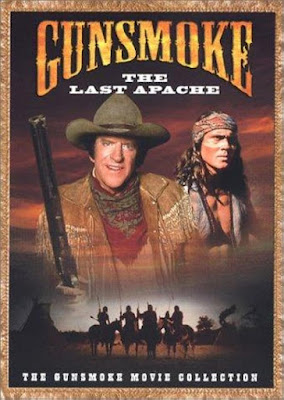Gunsmoke is an American television and radio series, first broadcast in 1955 and starring James Arness. It was the series broadcast in primetime with the most episodes in the history of American television for 43 years, until 2018, when it was surpassed by The Simpsons.
In the late 1940s, CBS president William S. Paley, a fan of the Philip Marlowe radio series, asked his head of programming, Hubell Robinson, to develop a hardcore Western series about a Philip Marlowe of the Old West. Robinson delegated this task to his West Coast vice president at CBS, Harry Ackerman, who had developed the Philip Marlowe series.
Ackerman and his writers, Mort Fine and David Friedkin, created an audition script titled "Mark Dillon Goes to Gouge Eye" based on one of their Michael Shayne radio scripts, "The Case of the Crooked Wheel," from mid-1948. Two versions were recorded. The first, recorded in June 1949, closely resembled a hard-boiled detective series and starred Michael Rye (credited as Rye Billsbury) as Dillon; The second, recorded in July 1949, starred Straight Arrow actor Howard Culver in a lighter, more Western version of the same script. CBS liked Culver's version better, and told Ackerman to move forward.
A complication arose when Culver's contract as the star of Straight Arrow prevented him from making another Western series. The project was put on hold for three years when producer Norman Macdonnell and writer John Meston discovered him while developing his own Western series for adults.
Macdonnell and Meston wanted to create an adult radio Western, in contrast to the prevailing youth series such as The Lone Ranger and The Cisco Kid. Gunsmoke was set in Dodge City, Kansas, during the booming cattle era of the 1870s. Dunning notes, "The series was critically acclaimed for its unprecedented realism."
Gunsmoke is often a grim show, especially in its early years. Dunning writes that Dillon "played his hand and often lost. He arrived too late to prevent a lynching. He amputated a dying man's leg and lost the patient anyway. He saved a girl from brutal rapists, then found himself unable to provide what she needed to keep her from turning to prostitution." Some listeners, like Dunning, argue that the radio version was more realistic. The episodes were aimed at adults with some of the most explicit content of its time, including violent crimes, scalping, massacres, and opium addicts. Many episodes end on a grim note, and the villains often get away with their crimes.
The show is set after the arrival of the railroad to Dodge City (1872), and Kansas had been a state since 1861. In reality, a U.S. A marshal (actually a deputy marshal, because only the highest-ranking officer in the district holds the title of "marshal") would not be based in Dodge City and would not be involved in local law enforcement.
Aside from its gloomy tone, Gunsmoke is distinguished from other radio westerns in that the dialogue is often slow and staccato, and the extraordinary sound effects give a palpable sense of the prairie setting. The effects are subtle yet multi-layered, giving the show a sense of spaciousness. John Dunning wrote, "The listener heard strange dialogue in the background, just above the muffled cries of children playing in an alley. He also heard noises from the next block, where the inevitable dog was barking."
Gunsmoke differs from other westerns in that it was not sponsored during the first years of production. The show was financed by CBS for the first two years. The producers of the series said that if the show were to be sponsored, they would have to "clean up the show." The producers wanted to find a sponsor who would allow them to keep the show as it was.
Shortly after the radio show began, talk of adapting it for television began. Privately, Macdonnell had a reserved interest in bringing the show to television, but publicly declared, "Our show is perfect for radio," and feared, as Dunning writes, "Gunsmoke, confined by an image, couldn't be as authentic or attentive to detail. In the end, CBS simply took it away from Macdonnell and began preparing the television version."
Conrad and the others were auditioned, but they were little more than token efforts—especially in Conrad's case, due to his obesity. However, Meston was retained as the primary writer. In the early years, most television episodes were adapted from radio scripts, often using identical scenes and dialogue. Dunning wrote: "That radio fans considered the television show a farce and its actors impostors should surprise no one. That the television show was not a farce is due in large part to the continuing strength of Meston's scripts."
Macdonnell and Meston continued the radio version of Gunsmoke until 1961, making it one of the longest-running period radio dramas.
Conrad directed two television episodes, in 1963 and 1971, and McNear appeared in six, playing characters other than Doc, including three times as grocer Howard Rudd.
In 1955, CBS executives attempted to cast John Wayne to play the lead character, Matt Dillon, but ultimately settled on James Arness. The series first aired that same year.
Between 1955 and 1961, each episode of the series was 30 minutes long, and later grew to an hour. Between 1955 and 1975, 635 episodes aired. Stars such as John Wayne (host of the pilot), Bette Davis, Harrison Ford, Jon Voight, Kurt Russell, Jodie Foster, and many more appeared on the show. In 1987, Gunsmoke: Return to Dodge was filmed, with Arness again in the role of Dillon. The film was followed by Gunsmoke: The Last Apache (1990), Gunsmoke: To the Last Man (1992), Gunsmoke: The Long Ride (1993), and Gunsmoke: One Man's Justice (1994).
















No comments:
Post a Comment